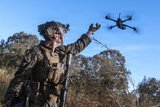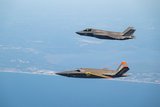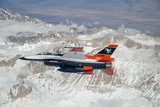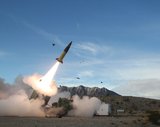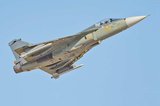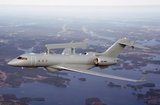BAE Systems and US DoD announce MUM-T success
Although the aircraft used in the test have not been disclosed, this picture was released by BAE Systems. (Image: BAE Systems)
BAE Systems and the US DoD’s Strategic Capabilities Office have announced the completion of a successful flight test of advanced Manned Unmanned Teaming (MUM-T) technology.
The technology allows the rapid infusion of new payloads and platforms into the fleet to quickly enhance mission effectiveness and counter adversary technology.
The flight test used real mission sensors on multiple uncrewed platforms and a single crewed gather aircraft to execute a mission.
The team of UAVs worked together to develop and execute autonomously the necessary tactics to complete the mission, while the pilot used the HMI to monitor the mission’s progress and interact with the uncrewed vehicles.
BAE System’s HMI was developed through extensive virtual and constructive simulation testing with assistance from pilots and electronic warfare officers, their feedback highlighted the user-friendly interface.
While the aircraft and UAV type involved in the test were not originally disclosed, BAE Systems has confirmed to Shephard that it was the BQM-34 Firebee and the F-18E/F Super Hornet.
Related Equipment in Defence Insight
More from Air Warfare
-
![Project Nightfall to test fire deep-strike capabilities for Ukraine by 2027]()
Project Nightfall to test fire deep-strike capabilities for Ukraine by 2027
The UK competition for industry to develop deep-strike capabilities for Ukraine in its war effort against Russia will also provide benefits for the country’s own long-range strike efforts.
-
![Can emergent suppliers of fighter aircraft crack Middle East markets?]()
Can emergent suppliers of fighter aircraft crack Middle East markets?
The 2025 Dubai Airshow saw several aspiring suppliers of combat aircraft to the region’s air forces parade their wares in the sky and on the ground. Shephard’s Edward Hunt explores their chance of success in the Middle East.
-
![Saab eyes fresh market opportunities for its GlobalEye AEW&C aircraft]()
Saab eyes fresh market opportunities for its GlobalEye AEW&C aircraft
As the E-7 Wedgetail faces prolonged production and technical delays as well as a recently abandoned contract from NATO, its competitor, the GlobalEye, may find new avenues for market growth.
-
![Podcast: Critical Care episode 6 - Embedded sustainment with the Royal Netherlands Air Force]()
Podcast: Critical Care episode 6 - Embedded sustainment with the Royal Netherlands Air Force
What happens when sustainment stops being a service and becomes a partnership?









